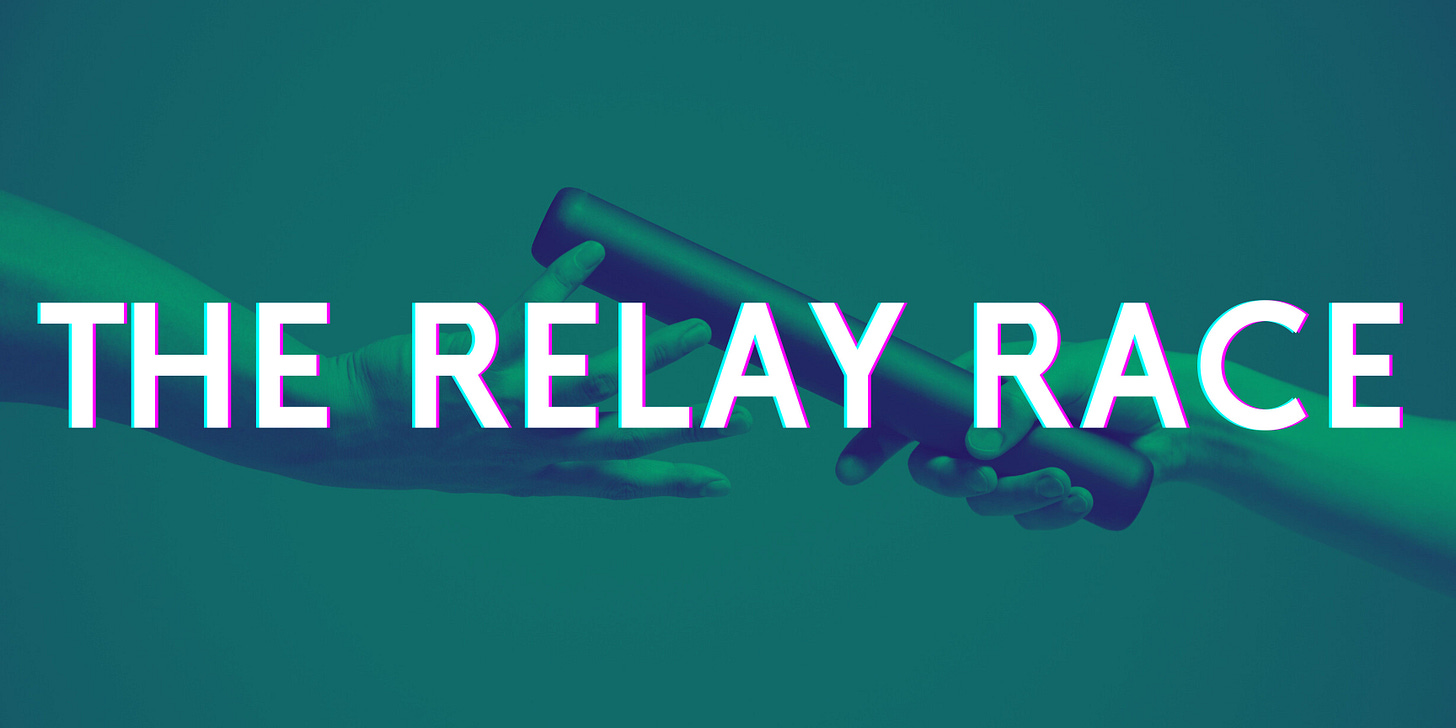The Relay Race: Working on Multiple Projects at Once
aka why your favorite authors are bad at answering email
Hello!
It’s been awhile, guys! I have to be honest with you, the reason for the delay is…the world. There’s so much going on every day that I’m having trouble parsing it all. Or any of it.
“How do I know what I think until I see what I say?” is one of my favorite writing quotes (E.M. Forster). Writing is how I make sense of myself, so if I find my mind empty (or, say, blank with panic) I sometimes look at what emerges from my writing. So instead of trying to say something new, I’m just going to give you this quote from Poster Girl, which came out in 2022.
"I did this because I don’t think anyone should have this data. Because I believe in creating stable systems. […] Just because you're not committing a crime now, by going where you go, by seeing who you see, doesn't mean that another government, another set of people with another set of priorities, won't come along and call you a criminal one day. The players change, the rules change, that's an inevitability. The most we can do is build a board that restricts what's possible. We can create limits to power. Understand?"
Hm.
Well, here’s what’s within my control: any space of mine will be as kind and welcoming as I can make it. If you are looking for suggestions on how to handle *gestures* all of this, may I recommend 5calls.org as a resource, as well as mutual aid orgs in your area. In Chicago you should check out Brave Space Alliance - which is not necessarily mutual aid? I don’t know the exact definitions. But it does good work. Also: Market Box!
With all that said, let me tell you about something fun. I think we could all use it.
Today I’m going to talk to you about a reality of publishing— at least, traditional publishing, which is the world that I occupy— that I’ve never been in the position to discuss before, which is: working on multiple projects at once, and how that goes. Like, in your brain.
It’s like a relay race, only 50% of the people passing the baton are…you.
First, some terms: I use letter codes for my works-in-progress. I’m currently at different points in five projects: TCAR (To Clutch A Razor, out September 16th), A&A1 and 2, and HDB 1 and 2. I can’t tell you about four of them, yet; luckily you don’t need to know to understand this newsletter. But here’s what my schedule has been for the past year-ish.
November 2023 - April 2024: Rough Drafting A&A-2
May 2024: Promoting When Among Crows
June - July 2024: Rough Drafting TCAR
August - November 2024: Rough Drafting HDB
two-week break in there for revising TCAR
December 2024: Revising A&A-1 (from my own notes)
one-week break in there for revising TCAR
January 2025-February 2025: Revising HDB (from early reader’s notes)
few-day break for TCAR copyedits
March 2025: Revising A&A-1 Again (from edit notes)
few-day break for TCAR proofreading notes
April 2025: Revising HDB (from edit notes)
That’s a lot of back and forth, right? So let’s talk about how it works.
First:
WHY DO YOU DO THIS TO YOURSELF?
Short answer: because it offers certain career advantages. In the industry we like to say that nothing sells backlist like frontlist— to translate, nothing sells your old books like a new book. Basically, you use the attention you get for something new to remind people you exist and have other books. For me, it’s a little different, because my backlistiest backlist is Divergent, and it still sells. But! I can’t tell you how many times I’ve had people tell me they had no idea I wrote anything other than Divergent. This is always slightly deflating and slightly encouraging at the same time. Deflating because, you know, no one wants to ONLY be known for the work they did when they were twenty-two years old. But encouraging because if they’re saying it, that means that thanks to some new book of mine that caught their attention, they now know not only about that new book, but every book I’ve written in between Divergent and now. Victory!
Usually (but not always), these projects occupy slightly different (or very different) places in the market. One might be for a different age category (middle grade, young adult, or adult), or in a different genre (romance, fantasy, mystery, etc.), or in a different format (graphic novel, regular novel). If they’re too wildly different, they don’t always help each other. But even books that occupy the same general area can take up a slightly different space in the market.
For example: Poster Girl was a more “grounded” science fiction read, so it ended up in a lot of places that are for “general fiction” readers instead of sci-fi readers; it was also a mystery, so I was welcomed into a couple mystery-oriented spaces, too. But When Among Crows is urban fantasy that doesn’t feel unfriendly to the YA crowd, so I went to a few YA events and to an assortment of Comic-Cons. See what I mean? There’s some overlap there, but the overlap is not perfect, so in theory, I catch slightly different people each time.
A BRIEF CAVEAT
People get all weird when creative types admit they do things like…strategize. It doesn’t fit that well into the whole “I do this for the pure love of it” sensitive artist vibe that people prefer from creative people. But I…hate that. So my caveat is that just because you do something on purpose and as effectively as possible doesn’t mean you don’t love it or have passion for it. It means that because you love the thing, you want to give it the best possible chance of reaching the people you want it to reach. Creativity and strategy and practicality can all join hands and be friends. And actually, the more you can let them do that, the better off you’ll be as a whole human being in the publishing industry.
OKAY BUT LITERALLY HOW, THOUGH
A lot of people find it hard to switch rapidly between different projects. I used to be one of them. But here’s what works for me (your mileage, as ever, may vary). First, on a grand scale: make a calendar.
If you’re at a traditional publisher, you can ask your editor when they’re anticipating particular stages such as: working backward from the release date, roughly when will you get first pass pages? How about copyedits? How about line edits? How about…your editorial letter? Like authors, not all editors have highly organized minds— but there is a rough timeline that each book has to follow. As long as you’re willing to be flexible, they’ll probably be willing to give you some sense of the timing.
Making a calendar helps prepare your brain for what’s coming. It also makes it easier to see when you have wiggle room in case something goes wrong. (Note: something will go wrong.)
BUT LIKE, TELL ME ABOUT GETTING YOUR BRAIN ON BOARD
The actual process of getting myself to switch gears between projects might be what you’re wondering about, so I’ll get to it. Here’s my basic process once I’ve turned in a draft and need to switch to a different story:
Stop telling myself it’s hard. I don’t believe I can fully think my way out of hard things, but it takes the difficulty down to 70% when I tell myself I can figure this out, because I have to. It works for me, I don’t know.
Take some time. I believe you should always rest once you’ve turned in a draft. Rest, see some friends, watch something you like, read a book that has nothing to do with your book, go on walks, take good care of yourself. How much time you take depends on how much you CAN take. But take some.
Go on a walk and listen to your book’s playlist. I make playlists for every single book I write, so for me, this is easy. If you don’t have a playlist, try making one. Just fill it with songs that remind you of your book or make it easier to picture things from your book. On the walk, let the images play out in your mind (if you’re someone who can picture things). Think about why you’re writing this story, what your favorite parts are, what you’re looking forward to working on most.
Do some rereading. Don’t go back and edit— I mean it, even if you’re someone who edits as they go! Just this once, try reading it just to read it, not to pick at it. It’s a different mindset. Whether it’s your outline or a scene or a whole section, just remind yourself what the voice sounds like.
Don’t expect it to feel good right away. When you get started right after the switch, you’re probably going to feel weird and detached from the story and it may take you an hour to write a paragraph that’s worth a damn. So just stop expecting to be in the flow right away. Press on. Sometimes writing feels like scrubbing a toilet, as I’ve said before (and will say again). Even if you have to delete the scene the next day, you got over the first hump, and that’s great.
ANOTHER IMPORTANT RULE
No cheating, basically. I don’t let myself think about the other project, even if my mind tries to return to it. I don’t listen to the songs on that project’s playlist, I don’t talk about it— it’s as if the other project does not exist.
The interesting thing about that— pretending the other project doesn’t exist, with as much mental discipline as I can muster— is that when I have to tag back in on the other project, I find that the forced mental distance has given me some good perspective on that story’s problems and challenges. Not thinking about it is like relaxing a muscle that you’ve been flexing. If you rest that muscle, it’ll be a lot better at flexing again when you need it.
So! Next time it seems like your favorite author is talking about three different projects…they probably are? In my particular sphere of exposure, there are more authors doing this ^^^ than working on one book at a time. (But it depends on what kinds of books they write. “Beefy tome” writers tend to have a longer-term writing strategy.)
And I can’t wait until I can ACTUALLY TELL YOU ABOUT THESE PROJECTS FOR THE LOVE OF—
V







My thanks to you for sharing your thoughts! I am ready to testify under oath that these practices really work! :) At least for me. Proven by many years of practice.
Although, I am a newbie in fiction, I am just trying to apply my planning skills here. Your post suggests that I am on the right track. Once again, many thanks and best wishes for success!
This was useful to me as short film writer, thanks!